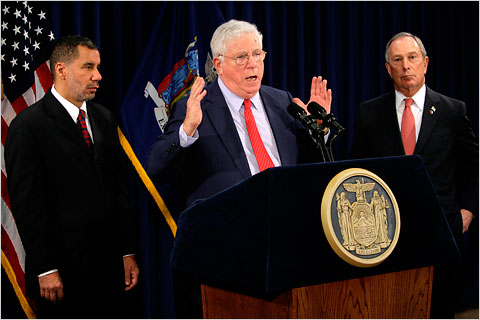
As first reported by the Daily News this morning, Governor Andrew Cuomo has nominated former Governor David Paterson to serve as the newest member of the MTA board.
Paterson is an unusually high-profile pick for the board -- he will have nominated some of his fellow board members -- and it's not yet clear what the political implications are of Cuomo selecting his predecessor. Will Paterson's status, for example, lend him more leeway to speak freely on transit issues than other gubernatorial nominees?
For transit advocates, there's a lot of promise in the possibility of David Paterson turning his attention to the MTA. What the system needs right now is money, and there aren't many public officials who know that better than Paterson.
It was Paterson that helped pass the payroll mobility tax, which brought in well over $1 billion a year for the MTA. That measure, unpopular with suburban lawmakers, has been absolutely critical in keeping the transit system afloat, though it wasn't enough to prevent Paterson from presiding over an unprecedented series of service cuts and fare hikes. Now, the payroll tax is under attack. Just last December, Senate Republicans won a deal to eliminate part of the tax, removing $320 million from the dedicated funding stream Paterson helped establish and forcing the MTA to depend on unreliable annual appropriations from Albany.
Moreover, Paterson knew at the time that even the payroll tax wasn't enough to pay for the aging transit system, and was perhaps the most important supporter of instituting tolls on the East and Harlem River bridges. Paterson first appointed Richard Ravitch to find a solution to the MTA's fiscal woes, then backed the resulting plan, including bridge tolls. "It’s either going to be fare hikes or it’s going to be tolls and a combination of payroll taxes, but it’s the only way,” said Paterson in 2008.
Eventually, Assembly Speaker Sheldon Silver endorsed bridge tolls, but the same amigos who temporarily handed control of the State Senate to Republicans also scuttled tolls in that chamber. Even after bridge tolls were officially dead, however, Paterson stayed firm in his support for them.
"The framework I see is that the Senate has really eliminated what my choice would be, which would be to have the tolls," Paterson said at the time. "If that's the case, then we're going to have to try to find alternative ways to come up with several hundred million dollars that would replace what would have been the revenues generated by the tolls."
Now the MTA is again headed toward the reckoning that Paterson confronted in 2009. The three years of the MTA capital program that Paterson wanted to pay for with bridge tolls? Cuomo paid for them with debt that transit riders will have to shoulder for decades. And experts say that the MTA can't pay for its next capital program, which is right around the corner, with more debt. The system needs new revenue, and soon. Paterson, if confirmed, will be perfectly positioned to make that case with authority and get a lot of attention in doing so.
"One thing I did for the three years I was governor was take tough stands, and I think that is going to be of some service,” Paterson told the Daily News.
On the other hand, Ben Kabak notes that Paterson repeatedly raided dedicated transit funds to help close the state's budget deficits, a practice which greatly exacerbated the MTA's financial difficulties.





